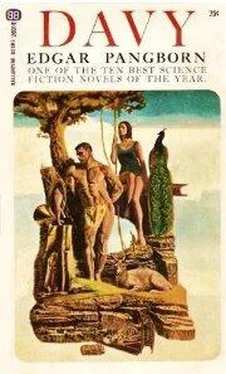The flute-player and the cornet man strolled a little way off and settled down with a deck of cards. I saw a tall broad-shouldered gray-headed woman, barefoot and dressed in a faded blue smock, come out to sit on the letdown back step of one of the big covered wagons and smoke a clay pipe in solid comfort. The white-haired drummer, the snowy owl, had quit his music too but stayed by the girls, fiat on his back with an ancient flopperoo of a farmer’s straw hat over his face and his drumsticks weighting it down in case a sudden wind should rise and find him disinclined to move. Stud Dabney was tremendous at that sort of thing: Pa Rumley called him the original God-damned inventor of peace and quiet. He devoted such enormous thought to working out new ways of being restful that it sometimes made him dreadfully tired, but he claimed this was in a good cause, and he’d keep it up b’ Jesus ’n’ Abraham, no matter if it wore him out into an early grave. He was sixty-eight.
That gray-haired woman on the wagon-steps had caught my attention about as strongly as the girls. It was her calm, I think. She’d done her morning chores and was enjoying the lazy break, but it was more than that. She spread calm around her, as other people may spread atmospheres of uneasiness or lust or whatever. Well, after I had known the lady quite a while — two years later, I think, when I was past sixteen — Mam Laura remarked to me that she thought her even disposition was partly a result of her trade of fortune-telling. “You can’t,” she said, “predict anything downright awful to the yucks, that’s obvious — bad for business even if they could take it, which they can’t. But I’ve got an old yen after truth inside me, Davy, same as your father has. So while I dream up sugartits of prophecy to happily the yucks and send ’em away imagining they amount to something, I’m thinking to myself about the actual happenings likely to come upon ’em — and upon me, merciful winds! — this side of death. It’s sobering, calming, Davy. Including the small happenings — I mean the ten million little everyday samenesses that leave you weathered after a while like an old rock, like me, like an old rock in sandy winds. Ai-yah, and after such thinking inside of me while I prophesy, I’m beat but sort of cleaned out too, peaceful, feel like acting nice to people for a change and mostly keeping my shirt on. Philosophy’s what it is, Davy — nay, and there’s another advantage of Rambler life (which I prophesy you’ll not be living all your days — you have a complicated future, love, too complicated for an old woman) and that is, a Rambler woman at my age (never mind what that is) can afford a smidgin of philosophy, the way I believe a woman can’t if she’s running the house and trying to fathom where romance went to and what in thunderuption ails her teener daughters…” She was spreading calm around her that first morning I saw her, smoking her pipe and studying everyone within her view but not seeming to.
I fidgeted against the fence rail and said: “Sam, for honest — how good do I blow that horn?”
“All I can do about music is like it. Can’t even no-way sing. You blow it, to me it sounds good.”
“’Greensleeves’, frinstance?”
The mandolin girl had a floppy lock of brown hair that tumbled over her eyes; kay, but the banjo girl had big full lips that started you thinking right away — well, “thinking” is the word I wrote there and I hate to scratch it out. The mandolin girl was still plinking a little, but mostly they were whisper-giggling together now, and I got the notion I was being analyzed.
“Ayah, ‘Greensleeves’ goes good,” Sam said. “Ramblers — well, they’re touchy people, you hear tell. Might be a wrong tell — never talked to any myself. Prideful, that’s for sure, and smart, and full of guts. Folk say they’re always ready for a fight but they never start one, and that’s good if it’s true. They take them big slow wagons into lone places no ordinary caravan woud ever go, and I’ve hearn tell of bandits tackling a Rambler outfit now and then, but never did hear of the bandits getting the best of it. Every Rambler boss got a silver token that gets him across any national boundary without no fuss, did you know that?”
“No, that a fact? Hoy, that means if we was with these people we could go smack over into Levannon, wouldn’t have to steal no boat and dodge the customs and so on?”
He caught my arm and swung me back and forth a little, so I’d keep my mouth shut while he thought. “Jackson, you been contemplating stealing a vessel for to cross the Hudson Sea and similar such-likes?”
“Oh,” I said, “maybe I done some thinking that a’n’t so big of a much. But is that a fact, Sam? They could get us across if they was a-mind to?”
“They wouldn’t do it smuggling style — lose their token if they did. I’ve hearn tell they never do that.”
“But they could maybe take us into the gang?”
He looked pretty sober, and let go my arm. “Wouldn’t be a one to say they couldn’t — you anyway. You got this music thing, and kind of a way with you.”
“Well hell, I wouldn’t go with ’em unless you did.”
He spread out his big clever hands on the fence rail, more than ever quiet and full of reflection, studying all we could see of the Ramblers’ layout. One of the plain wagons was parked, blocked up with its open rear toward the fence, near where the girls were loafing, and several large boxes stood in it; that would be the selling wagon, I knew from Rambler shows I’d seen at Skoar — they’d have a pitch going there by afternoon, with cure-all medicines and considerable junk, some of it good: I’d bought my fine Katskil knife from a Rambler trader. Another wagon, a covered one, stood facing a wide roped-off area of ground, and it had an open side; that would be the theater. “In that case,” said Sam, and I felt he was as nearly happy as either of us could be with East Perkunsvil so short a way in the past — “in that case I believe you might give it a go, Jackson, for I think I see my way clear to go along.”
“What you got in mind?”
“Terr’ble question, Jackson, always — nay, if I’m a-mind to squeeze, worm or weasel my way into some place where I a’n’t expected, I most generally do. Wait a shake.” I’d been about to clamber over the fence before my nerve gave out, but just then a new man came in sight around the wagon where the gray-haired woman was sitting, and leaned against the back step to pass the time of day with her.
He wasn’t actualy big — not as tall as Sam — but managed to seem so, partly with the help of a thick black shag of beard that grew half-way down his chest. The black tangle matching it on his head hadn’t been cut for two or three months, but I noticed the man had his vanities: his brown shirt and white loin-rag were clean and fresh, and his hairy legs wound up in a pair of moose-hide moccasins as wonderful as any I ever saw, for their gilt ornaments were nudes, and the antics he could make those golden girls perform just by wiggling his toes would have stirred up the juices of youth in the dustiest Egyptian mummy and I mean a married one.
Sam said: “I get a feeling that’s their boss-man, Jackson. Look him over. Try and imagine him getting mad about something.”
I swung myself over the fence. Once over, I felt everyone watching me — the girls, the card-players, even the white-haired man from under his straw hat, and the blackbearded boss-man whose voice was still going on in a mild rumble like a thunder-roll ten miles away. “Da,” I said — Sam smiled quickly, wincingly as if all pleasure were partly pain, and I dare say it is — “Da, I can imagine it, but I can’t no-way express it.”
“Uhha. Well, you heam tell about the hazy old fa’mer that got so nearsighted he set out to milk a bull?”
Читать дальше












